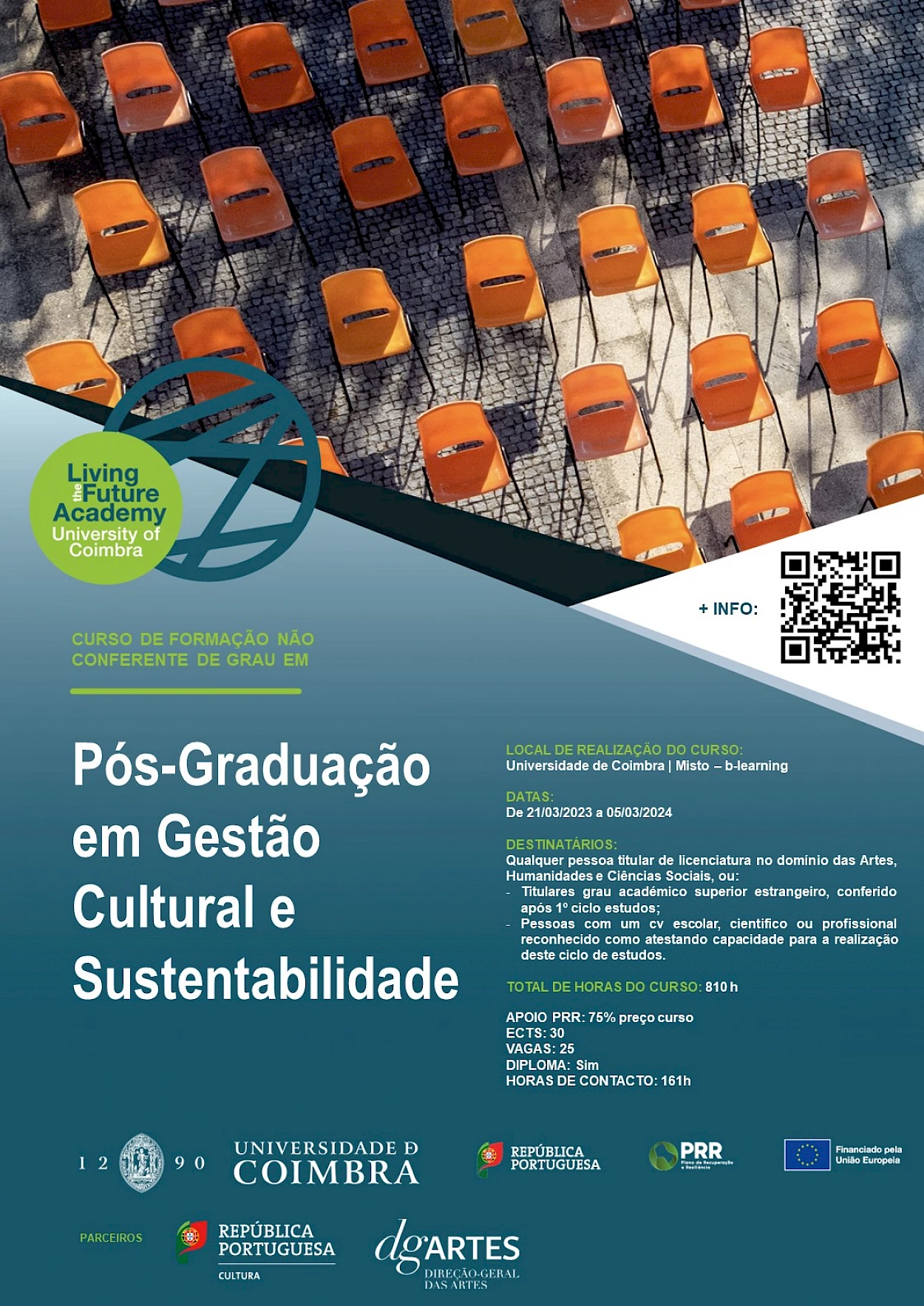1st Edition 23/24
Post-Graduate Diploma in Arts Management and Sustainability
Introduction
The Post-Graduate Diploma in Arts Management and Sustainability investigates the transformations that a change as colossal as the one forecast by the green transition can bring into the performing arts. It considers the evolving cultural policy framework as well as the field’s specific modes of production, and aesthetic/creative approaches, aiming at connecting the demands of environmental and social sustainability to the political, ethical and practical challenges they pose to arts management models, theories and practices. Based on an exploratory and critical approach, the course serves two correlated purposes: to update thinking around discourses and practices of cultural policy, and suggest an initial, experimental approach to sustainability, translated into the exploration of concepts and into the analysis of practices in the field of eco-dramaturgy, environmental justice, eco-ethical management, eco-producing, among others.
Intersecting the fields of artistic studies, creative production and ecology, it is a unique and rather ground-breaking capacity-building programme, seeking to respond to an emerging set of reflective needs and competencies of the cultural sector.
Background
The collective experience of the pandemic made climate change more visible and tangible than ever: the urgency to tackle it from all sectors of society has stepped up and the arts and culture are no exception. In the field of the performing arts, artists, producers, and decision-makers are currently dealing not only with the sector’s pre-existent shortcomings but also trying to renegotiate the relationship with our planetary host (Latour, 2017). ‘Greening' the performing arts has become, thus, an expanding area of action, debate, and research.
In that quest towards the green transition, the arts have mostly been challenged to take on the role of raising awareness around the severity of the climate crisis, given that their ability to tell stories, to offer narratives which “make complex relationships between entangled (eco)systems understandable” (Skolczylas,2021:6) is increasingly confirmed by behavioural scientists (Banerjee and Shreedhar, 2021). On that account, this storytelling capacity has been the main case of advocacy campaigns, where culture is often portrayed as “the missing link to climate action” (Julie’s Bicycle, 2021). Illustrative examples are mounting, and pioneers such as Creative Carbon Scotland or Julie’s Bicycle have been joined both by the most relevant professional and political players of the field: IETM, Europa Nostra, the European Theatre Convention, On the Move, among others, have several initiatives under way, materialized by an array of projects (Perform Europe, Theatre Green Book, Sustainable Action Code, Creative Climate Leadership, i.a.). At policy-level, mainstreaming environmental sustainability criteria across European funding schemes for the creative and culture sector is well under way (Vries, 2021) and is soundly justified by their alignment with the UN's SGDs. There is a constant proliferation of reports, toolkits and legislation designed to mainstream environmental awareness and foster concrete action.
In Portugal, the first nation-wide study on “Ecological and sustainable practices in the performing arts” (conducted independently by CEIS20 at the University of Coimbra in collaboration with the Directorate-General for the Arts/Ministry of Culture) has recently been launched, and its results are expected to inform debate and form a basis of knowledge for recommendations for policymaking.
The University of Coimbra and, specifically, the Modes of Production | Performing Arts in Transition platform has been working towards developing a comprehensive approach to the issue of sustainability and the performing arts, through competitive research grants, knowledge transfer projects co-designed with cultural institutions, and capacity-building. This Post-Graduate Programme is a result of such combined efforts.
Promoters
University of Coimbra, via the Rector and the Faculty of Arts and Humanities, in association with CEIS20 - Centre for Interdisciplinary Studies.
Institutional Partnership:
Directorate-General for the Arts/ Portuguese Republic - Government
Funding:
Investment RE-C06-i03 - Incentivo Adultos e Investimento RE-C06-i04 - Impulso Jovens STEAM in the framework of the project Living the Future Academy supported by PRR - Plano de Recuperação e Resiliência and Next Generation EU
Programme
- Cultural Policies and Social and Environmental Sustainability
Cultural policies: key concepts and milestones
Arts management, cultural policies, and the ecological imperative
ew discourses: changing paradigms of contemporary cultural policies
- Eco-ethics and project management
Modes and models of work in the arts
Internationalization and transnational cooperation
Environmental and eco-ethical sustainability
Ecology applied to production in the performing arts
- Eco-dramaturgy, eco-performance and eco-criticism
Eco-criticism and ecological thinking
Imagination and ecology: between performance and new dramaturgies
Case studies: guest artists (Eco-conscious artistic practices)
- Laboratory
Laboratory: framework, methodologies and processes.
Development of individual or collective projects of research or organizational change (tutorial regime)
Laboratory: presentation and discussion of deliverables.
Video
Objectives
By the end of the course, participants are expected to be able to:
- establish links between the multiple contemporary challenges of sustainability, the design of cultural policies and projects, and the evolving roles of cultural management;
- develop analytical and experimental capacities around the possibilities of reconfiguring the arts and culture' modi operandi in the face of environmental challenges and social-economic inequalities;
- distinguish different forms of creative production and arts management, and their implications for internal collaboration, leadership and governance;
- acknowledge and discuss the potentiality and applicability of the concepts and practices of eco-dramaturgy, eco-performance and eco-production in the processes of creation, production and touring of performing arts
- develop micro research projects or organisational change plans in the field of eco-production.
Coordination and Teaching
Scientific and Pedagogic Supervision:
Vânia Rodrigues e Fernando M. Oliveira
Principal Professor:
Vânia Rodrigues
Invited contributors:
Benjamin Twist (Scotland), Catarina Vaz Pinto (Portugal), Daniele Sampaio (Brazil) Fernando M. Oliveira (Portugal), Herman Bashiron-Mendolicchio (Catalonia/Spain), Iphigenia Taxopoulou (Greece), Milena Dragisevic Sesic (Serbia), Paula Abreu (Portugal), Pedro Quintela (Portugal), Thomas Schmidt (Germany), among other to be announced, including international case studies and projects, developed in the framework of festivals, artistic institutions and colectives.
Custo
PREÇO DO CURSO A SUPORTAR PELOS PARTICIPANTES: 200 €
(O preço do curso é de 800€ e terá um apoio de 75% do PRR -Projeto Living the Future Academy - na forma de bolsa, em consonância com a tipologia de bolsas prevista no Regulamento para Atribuição de Incentivos à Capacitação de Jovens e Adultos no Âmbito do Projeto Living the Future Academy).
Condições de atribuição de bolsa:
Os eventuais benefícios financeiros que venham a ser atribuídos no âmbito do PRR, estão condicionados aos candidatos detentores de NIF português e residência em Portugal, à data da realização do curso.
Dates and other practicalities
The programme will run from the 21st March 2023 to the 5th March 2024.
Blended-learning regime: 30 sessions, of which 18 require in-person attendance and 12 will be held online.
Sessions are on always Tuesdays, mainly half days (2pm-6pm); approx. 8 full days in person (10.30 am-1 pm / 2.30-6 pm)
Working language is Portuguese, with occasional use of English and Spanish (foreign lecturers).
Contacts, Information and Applications
For more information, please reach out to the Course Supervisor: vania.rodrigues@uc.pt
To apply, follow this link: https://apps.uc.pt/courses/PT/course/10701



